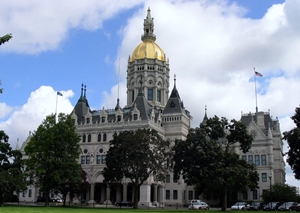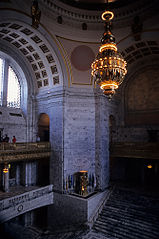The state’s legislature has agreed to a bill amending the code of ethics. Senate Bill 850, now known as Public Act 15-15, creates an additional exception to the definition of expenditure, adds to who is not included in the definition […]
 The state’s legislature has agreed to a bill amending the code of ethics.
The state’s legislature has agreed to a bill amending the code of ethics.
Senate Bill 850, now known as Public Act 15-15, creates an additional exception to the definition of expenditure, adds to who is not included in the definition of a lobbyist, and raises the threshold for lobbyist registration from $2,000 to $3,000.
After passing both chambers, the measure awaits the governor’s signature. If signed, the new provisions will be effective January 1, 2016.
Photo of the Connecticut State Capitol by jglazer75 on Wikimedia Commons.
January 27, 2014 •
Washington Senate Bill 6414 Mandates Electronic Filing, Public Availability of Reports
Senate Bill 6414, introduced this week by a group of Washington senators led by Senator Joe Fain, requires all reports to be filed electronically. The bill contains several other strictures, including requiring the Public Disclosure Commission to make all filings […]

Senate Bill 6414, introduced this week by a group of Washington senators led by Senator Joe Fain, requires all reports to be filed electronically. The bill contains several other strictures, including requiring the Public Disclosure Commission to make all filings available on its website, mandating each lobbyist or lobbyist’s employer sharing in an expenditure greater than $25 to report the specific dollar amount of his or her share, and requiring all lobbyist filings to include an itemized list of all payments made to a state official, regardless of dollar amount.
Another section of the bill implores the Ethics Board to define the limits of “infrequent occasions” in the context of the acceptance of gifts of food and beverages by public officials from lobbyists. This section of the bill comes after a widely-read report showing the state’s 50 most active lobbyists pampered legislators with meals totaling more than $65,000 over a four-month period.
A final section of the bill allows lobbyists to avoid reporting expenses for a legislator’s food at a meeting with the lobbyist if such expenses were paid by the legislator.
Photo of the interior of the Washington State Capitol courtesy of Eric Hunt on Wikimedia Commons.
State and Federal Communications, Inc. provides research and consulting services for government relations professionals on lobbying laws, procurement lobbying laws, political contribution laws in the United States and Canada. Learn more by visiting stateandfed.com.


